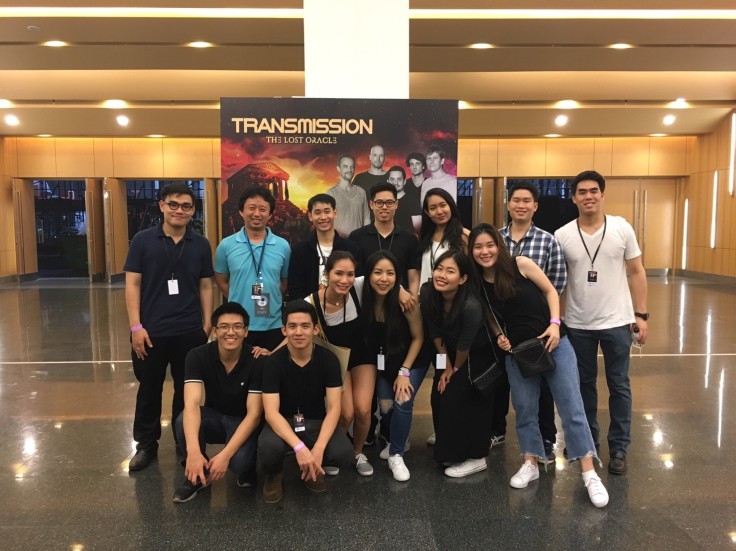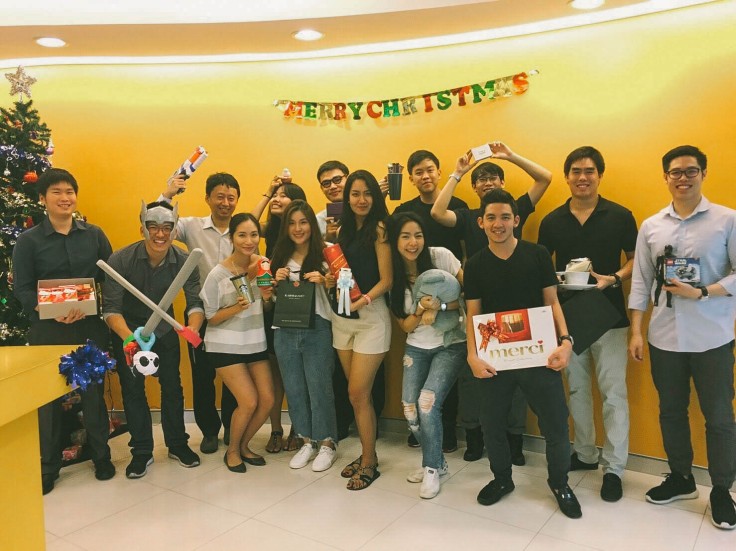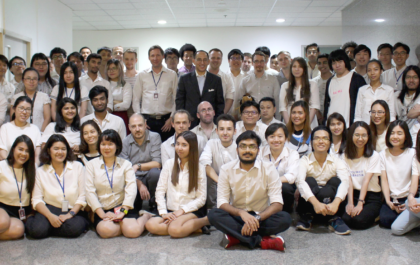Striking the right chord in the marketplace is about luck and timing.
But It is also about kinetic energy and strong work ethic, confidence and determination, laser sharp focus and being in sync with trends, all traits that Panupong has in abundance.
Event attendees and Organizers today cannot imagine a world without Ticketmelon, the company he founded two years ago which today is one of the top ticketing and event platforms in Thailand.
Ticketmelon provides solutions for events of all types and sizes, equipped with analytical insights, end-to-end solutions and customized marketing support to amplify user experience.
And they’re just starting out. With the company spreading its branches to neighbouring countries, we can be sure that International Live Events will never be the same.
This interview is a treat for any aspiring or even an experienced entrepreneur, and is peppered with gems of inspiration, practical lessons and philosophy from a young man mature beyond his years.
Enjoy.
Ticketmelon can be found at ticketmelon.com

GenUp : Hi, please tell us a bit about yourself.
Panupong: I’m 25 years old, and I finished my high school from Ruam Rudee International school in Bangkok and studied finance at Chula University. I have been studying in Thailand my whole life. I’m dyslexic and was diagnosed when I was very young. I struggled to read for a long time, and fortunately they caught it early and I went through a program and learned to read.
GenUp: What was your initial spark ? What motivated you to go the entrepreneurial path?
Panupong: I started to be interested in business probably when I was 15. At that time, I became very fascinated with the idea of value discrepancy and gap of what one can achieve, say in the States and here in Thailand. For instance, let’s say DTAC, which by Thai standards is a very successful company here and makes about 7 Billion baht per year. But if you look at a company like Amazon, which I understand is a completely different company as far as market size etc, but still, the difference is such that it makes like 700 trillion baht per quarter. So what fascinates me is that both Jeff Bezos and the CEO of DTAC have 24 hours in a day but the value gap is huge. And so I became absolutely fascinated with this at a very early age. I was always reading about Bill Gates and Jeff Bezos and Elon Musk and Peter Thiel and they were totally amazing to me. They were my idols. And so that was something that I wanted to experience, because most of the people I talked to assumed that being like them was a completely impossible dream. Too big of a dream, totally impossible to even contemplate doing it. So I really wanted to know what it would be like to achieve that. So that was and is definitely my obsession. And the only way to experience this is would be to do it myself.
GenUp: And did your family support you in your decision?
Panupong: Well our family history was such that we had started out being entrepreneurial and then all that changed with the new generation. But despite this, my father has continued to be very supportive of me. He always said, yes, you go ahead and do what you want to do. My mother on the other hand, always told me to get a job. Until Ticketmelon were featured on Forbes, she continued to tell me to get a real job with a stable company like McKinsey or something, and then when we were featured she said ok, my son is not wasting his time. I still remember when I first started, I was doing something called Clicktalad which was this website that I never launched but which laid the foundation for Ticketmelon. And I was staying late after school to work on this site and my mother was always upset that I was staying late in school with my friends.
In my third year of college I founded Precise Media, which was funded by a guest lecturer in Chula. It focuses on niche media solutions and has a full time CEO and is self sustaining. I’m still a director there. Our latest product is called Pet care TV, which if you go to a vet there’s an advertising screen in the waiting room and shows dog and pet food brands. Right now we have 8 brands running on the display and there is a network of 400 clinics using the system.
GenUp: What was Clicktalad?
Panupong : Clicktalad was our project that never launched. In 2010 or 2011, there were these websites with terrible user interfaces and we saw the opportunity to create a beautiful, easy to use website and offer that customer experience that we knew was a winning formula in the States. But as we were doing it, Lazada and Zamora came along and all of a sudden people knew how to make successful E Commerce companies. So it just became a battle about money and how long one could stay in the game. For instance, Zalora came in with a marketing budget of 800 million baht and it became a matter of aggressive scaling and so we made the decision to not do Clicktalad. Which in retrospect was a good thing because the companies that were popular before Lazada and Zamora like “talad.com” and “weloveshopping.com” are now nowhere to be found and the survivors are the companies that had all this money to burn.

GenUp: Talk to us about Ticketmelon.
Panupong: Right, sure. Ticketmelon is an Event Technology company, which includes Ticketing solutions, In-event solutions such as cashless payments, and Data Analytics. We provide a full suite of solutions that help event marketers optimize their event marketing initiatives. Their event operations aspect is streamlined with cashless payment as well as ticketing experiences for the ticket buyers. Parallel to that we also have a place where visitors can discover events. So we have a lot of visitors coming to the site to discover events. Before this, there hasn’t been a platform to reach out to the public.
Our ideal customers are event organizers, whether they are their own brand or whether they are organizing agencies who do organizing services for their clients.
On the front end, the Ticketmelon brand is well knows to ticket buyers, which is the B2C aspect.
What we focus on is any activity that requires the physical gathering of people, so that means that it can be any sort of event. When we talk about events, people think, oh it needs to be some big concert or trade show, but actually what we want to be is a part of any sort of physical gathering of people. And we want technology to help facilitate those interactions, bring people together easily, and improve the client experience. So that’s the core concept around which everything is based. So when you look at the website you see a wide variety of events like a small 8 people wine tasting event all the way up to a full scale concert with 20,000 people. So where people gather is where we are.
GenUp : How do people find you? What is the marketing channel that you use?
Panupong: Social media is one of our biggest drivers of traffic. Events are a very social experience since you go to an event because your friend is going to an event and so on and so forth. So social media becomes very key in sharing events.
As far as organizer acquisition goes, it is largely a direct sales process. We email or call them to set up a meeting. Recently though it has been very heavy on word of mouth, like maybe 70 to 80% of the time. We launched in August 2015 so it’s been about 2 years and 4 months and people tend to know about us now. Objectively, we are the largest event platform for entertainment, based on the number of events that we’ve achieved, and we’re in the top 3 based on the number of tickets sold.

GenUp: Did you follow your business plan strictly or did you have to adapt along the way?
Panupong: Well, up to this day, our business plan largely remains the same. The changes were more on the tactical and strategic level. We’ve had to fine tune them. I had the idea for Ticketmelon since high school, since grade 12, and the market has changed quite a bit since then and so we’ve adapted to optimise our chances of success. But the vision remains largely the same. We wanted to be the destination for the discovery of events and that continues to be so. The fact that we are in the top three largest ticketing vendor category in Thailand is evidence that we are still moving towards that vision.
GenUp: What was the biggest hurdle you faced? Did you make any mistakes along the way?
Panupong: Oh yes, of course! We make mistakes all the time! But it’s the way you recover. Being an entrepreneur means making very important decisions based on very little information and data, so there are prone to be mistakes. So adaptability and speed becomes very crucial, so that you don’t get driven away from your end goal. On of our biggest hurdles was definitely fund raising. It’s very challenging. Hiring is very challenging. Despite this though, we are very much unfazed by it. I knew what I was signing up for, and the mentality of failure and giving up, is very different from the way other people may think about it. What is mostly troubling for me in business, is when things take longer than I want. The stress aspect is fine. If you’re an entrepreneur and you can’t handle the stress then maybe you’re mentally not made for this. So when I define something that is a hurdle for me, I mean time. Things often just take too long, and it distracts us from the things that we want to achieve.
GenUp: When you talk about how long it takes, are you referring to funding?
Panupong: Yes. Funding takes a long time. The previous two equity rounds were largely friends and family. We had amazing Angel investors who believed in us and are still on the board today. Besides that there was another Angel investor, and a family member who really supported us. Going forward, we want to focus on raising VC funding.

GenUp: With the way your business is going and the support from the various people you know, why do you need VC funding?
Panupong: The most important reason is Professionalism. At the end of the day it is very important that we don’t get too complacent about our success. I’m not saying we’ve arrived or anything, but we have made progress and it is important to make sure that I am my team continue to be pressured, so as to bring out the best in us that we can achieve. Having professional board meetings, being absolutely strict on KPI’s, Reporting etc., we want that. We want to create an environment where we’re absolutely professional. We want to make it clear that this is not in any way a hobby or a side project that we want to do. We want to build a long lasting organisation, a brand that our generation can be proud of. During every generation, iconic brands are created and we want Ticketmelon to be that iconic brand. This takes a lot of focus, it takes a lot of dedication and so having VC money helps create the environment that would force us to always remain at optimal efficiency. During the VC meetings we had, some of them told us that they were more relaxed with regards to board meetings etc, and some told us that they needed monthly board meetings. We said great, actually preferring the latter types who are more strict and formal. It pushes us and challenges us and makes us move very quickly and that’s the kind of environment that’s needed to get us where we want to be. I just like the intensity and thrive on it. Oftentimes, the best solutions that I come up with is when I’m desperate and I’m in a corner. Asking very tough questions and stretching to find the answers is something very useful for the company. And sometimes, it’s ok to not have the answer. It’s totally ok. That’s the whole point, because you now know that you don’t have all the answers and so now what are you going to do about it? So it definitely pushes me out of my comfort zone. I was funded for Ticketmelon when I was in my 4th year of college and we were doing the shareholder agreements at the exact time that my final exams were going on. I was going to the lawyers and then pulling out my books right after that. And for the first time in my life I went through like, two anxiety attacks. I had never experienced them before. But doing that pushed the boundary of my comfort zone and now I have a much bigger comfort zone.The old stuff will not stress me anymore. My capacity to suffer increased and that helped a lot. So moving forward, our struggles with business, our challenges, competition, all of the stuff is pushing us. And then suddenly in retrospect you realize that something that used to be a big deal for us, like our regular board meetings is now easy. So when we look at a potential VC, I wan to know if they’re going to push me forward. For example, we do everything on a local level and I want to start doing things on a regional or international level. We’re talking about scaling and dealing with culture and marketing on an international level, and these are going to be huge challenges and I am absolutely excited about them. I want to make my mistakes, learn and figure out all this and then look back and say, oh wow, now I know how to do all this internationally. All this is so exciting.
GenUp: Have you ever experienced failure? How did you bounce back?
Panupong: Depends on how you define failure. A lot of people think failure as this uncontrollable thing, like an act from God or some outside force. But I view failure as a choice. Look, a company is only as good as its people, and you have the power to decide if you want it to work or not. I you look at the mortality rate of startups, it’s like 90-95%. And if you look at their reasons for failure, for instance funding, product issues, bad market fit, insufficient cash flow etc, the problem with that is those aren’t the reasons for failure. Those are problems that you have the job to solve. It is what you are in business to do. But you make that decision to not do those things, or not solve those problems and so you in fact decided to fail. If you can’t get the right product market fit, then fix the damn product. You decided not to take the time to go study the market, interview the people, fix the product, go interview them again and see if customer feedback is better. You decided to not do it and so you decided to fail. So you ran out of money and couldn’t fundraise. Why couldn’t you fund raise? You didn’t have enough traction. So fix it. But if you don’t then you made a very rational decision to fail. When I think about failure, I never think that failure is this uncontrollable factor. And what’s terrible is that the startup community and the media is able to somehow allocate this failure responsibility to this thing that is outside your control. And this gave entrepreneurs an excuse, oh because of this or because of that. So the way I look at failure is very different.
So on that note, have we failed? Perhaps the only thing that we fail at is timing. We wish things would go faster. We have a very clear picture on where we want to be 5 years from now and 8 years from now and whenever it takes longer, it adds months to our timeline. That’s part of our learning experience, I guess.

GenUp: What do you do to stay motivated? What drives you?
Panupong: Probably my biggest motivator is that I want to minimize regret. There are times, in the fatigue of things like say, fundraising, when we feel a bit low. But the only thing that reminds me to keeps me going is that I know for a fact that if I didn’t do this, and I’m on my death bed and have a week left to live or something, and I look back at my life and remember that when I was 20 and had a good education, good health, had everything and all the tools I needed and I didn’t do it, I would never forgive myself. Never. So the concept of death is my biggest foundational driver. I was asked once what if someone wanted to buy my company for $500 million, I probably wouldn’t sell it because I would have to do all this again from scratch. I’m totally obsessed with the process of making $2Billion and I want to see what it would take to be someone like Jeff Bezos. I just want to see what it would take and that for me is a life that is worth experiencing. Whether I get there or not doesn’t matter.
GenUp: Who do you admire? Any books or people that have motivated or continue to motivate you?
Panupong: There are a lot of people I admire and I admire different people for different reasons. Different aspects of people appeal to me. From a business side, there are a lot of people. Off the top of my head, there’s Elon Musk. The amount of dedication of this man and the amount of risk that he took is amazing. He put the company way beyond himself. When he started Space X and Tesla, he had to go sleep at his friend’s place at some point since he had no money. Because after he sold Paypal, he put all his money into the new company and that is the level of dedication that I admire. And there’s Masayoshi Son, the founder of SoftBank. You may know this story. At 16, he was so obsessed with Den Fujita, the founder of McDonald’s Japan, that he called repeatedly to try to meet with him but he kept getting rejected. So the teenager flew to Tokyo and just showed up at Fujita’s office just so he could see his face. He told the receptionist that all he wanted to do was see Mr. Fujita’s face for 3 minutes. The receptionist finally relented and he was allowed up to the offices. Son and Fujita spoke for 15 minutes and Son asked Fujita what business he should do, what industry he should be involved in, and Fujita told him to look to the future and be involved in the computer business. And today the world has Softbank. His persistency is absolutely fascinating. And so my admiration for people like this is that we all talk about luck and how lucky some people are and yes, luck does play a role. But the persistency of these people, the drive to achieve is amazing. Like what’s going to stop them? Nothing. And so it comes as no surprise that they are where they are today. We want to absorb that culture and persistency, be obsessed with continuous learning, continuous acquisition of knowledge and most importantly, doing something about it. Because the best practices are very well documented. All that needs to be done is to do it. One must do it.
GenUp: What don’t you like about being an entrepreneur ? What would you tell your younger self about the path he was about to take?
Panupong: I keep going back to the concept of time. Things always take longer than you hope. I prepared myself when I was young and read a lot of business books starting from when I was in high school. I prepared with the knowledge that the foundation of everything is mental temperament. It is extremely mentally straining. I knew what to expect. But there are these things that are annoying to me that I didn’t realize, which is the long time that processes and bureaucracy takes.
One thing that I would tell my younger self is that adults aren’t what they make out to be. They show themselves to be a certain way to kids. They create this image and you expect that adults would have the discipline thing all figured out but then you see that they don’t and that is directly reflected in their status in life. If anything, it is probably very encouraging, because you see that if they did only this much and they could achieve this, how much more I would achieve if I could do better. So the actual reality isn’t the age, but the character, the discipline, the dedication that differentiates people for human success.

GenUp: What does success in life mean to you?
Panupong: Doing what you love. Sure you can’t expect to get what you want every day, there are definitely challenges. But at the core I am working towards a 2 Billion dollar company and all these things are stepping stones. So you keep your focus on each progressive step at a time. Obsess about each individual step and one day you look back and you’ve come a long way. So we soldier on. Money has nothing to do with it except as a focusing point for doing what you love. So yes we have a number but doing what I love is success. What’s extremely exciting is that once I break through to the $2 billion dollar hurdle, and I’m in my 40’s then I can break through to bigger numbers. Just look at what Google has done and continue to do everyday. People do themselves a disservice by not aiming high. When we say that we want to be a $2 Billion company, we look at the number and extrapolate what needs to be done and the time that it takes to do it. We keep going smaller until we now know exactly what needs to be done this quarter to stay on track to get to that $2 billion mark. And that’s what I present to the board. So if you want to be a $2 billion company, you break down those steps and you just execute. It’s a goal, a target and we break it down and compress it into bite sized targets. Marketing and sales KPI’s are quarterly and we keep at it. Break down what we have to achieve to get there. Why wouldn’t you that ? What would you get from not doing so, other than emotional comfort.
So success is doing what you love and the goal is just the goal.
GenUp: What advice would you give someone who’s considering the entrepreneurial path?
Panupong: There are two key pieces of advice. The first is Mental temperament. You really need to have the right mental temperament. Let’s say you want to be a Billion dollar company vs a 10 million baht company, it’s very, very different. The procedure to get to each is very different. So you have to have the right mental temperament to match your goal. So as we mentioned earlier, regarding failure. Someone says, oh I couldn’t fund raise and then they give up, or they were too fatigued or too lazy to the product market test, and they gave up. So you have to have the right mental temperament to get to your goals. So if you’re targeting Billion dollars, it’s your life’s work and you’d better be totally committed to it. If it’s a 10 million baht then maybe it’s a 5 or 8 year project for you. The character and discipline must match your target.
The other aspect is that there is a huge difference between building a product and building an organisation. Most companies start with building a product and then when they grow, they have to acquire skills of organization building. And that’s where many people start running into problems. Because it’s a totally different skill set. Building an organization means you have to have strong depth and access to 7 areas. Product development, sales, marketing legal, tax, finance and HR. Those are the things that drive the company and as a manager you have to have depth in all these areas, since this is what is going to make this into a business. So you can develop a great product and you can problem solve but if you want to maintain your position as Executive CEO, knowledge of organization is absolutely the driver. Most people think that because they started this, they have to run it. That is a big mistake. There are some people with both, like Bill Gates who was a coder and also did well building a business; and Mark Zuckerberg who was a product developer and had organisational knowledge. Or Elon Musk and Jeff Bezos. So if you are good at product and creativity, and not at business building, realize that you have to fill that gap. Be aware of your limitations so that the product and the company both have a place in the world in a sustainable way.
GenUp: Great talking to you, Panupong, Thank you very much!
Panupong: You’re very welcome!
Genup: Where can we go to learn more?
Related posts
Today's pick
Hot topics
Welcome to Generation Upstart
It starts with an idea — a fusion of thoughts and experiences, a blending of desires and dreams. Bursts of electricity fueled with faith, love and creativity leap across synapses generating the necessary expression to give it real form and substance. Sometimes, an entrepreneur’s call…
Careerlist: Never Waste a Crisis
According to Michael Scissons, the most important thing you can do to maximize your chance of entrepreneurial success is to build your tribe. Start as early as possible, trimming and pruning like a patient gardener, while continuing to add value to the network. For these…
RingZero: On Employee Satisfaction and Success
Great people make the great teams that make the great workplaces, and Mr. Asmat Yousri is a big believer in people. After all, he has been at this since 1996. An ex-banker, he saw no obstacles transitioning from a corporate position to an entrepreneur. In…



